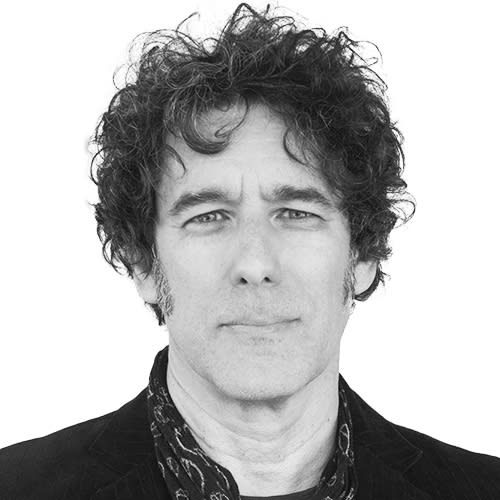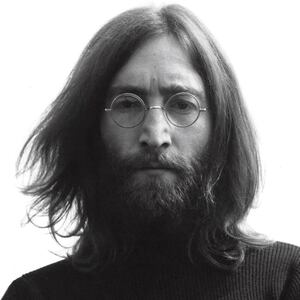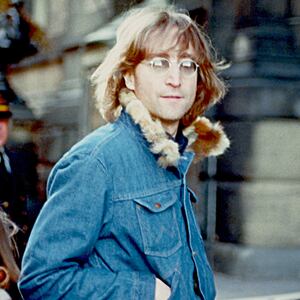It’s hard to imagine, with just seven studio albums and a few assorted singles released during his lifetime, that any of John Lennon’s solo work could go essentially forgotten, but the ridiculously underappreciated Mind Games is just that.
Released in the wake of Lennon and wife Yoko Ono’s agitprop Sometime In New York City, which led many fans to wonder what was going on with Lennon—and the always paranoid Nixon Administration to brand Lennon a political enemy and have him followed by the FBI and his phones tapped—Mind Games did respectable sales numbers upon release in 1973, but hardly those befitting a former-Beatle.
“When Mind Games came out, as a fan back then, my initial reaction was of being a little bit disappointed,” recalls Rob Stevens, who has acted as Yoko Ono’s archivist for decades and who worked on the new box set, Mind Games (The Ultimate Collection), out now. “But upon the years passing, what I found was that, in retrospect, it wasn’t the John Lennon I wanted to hear. Because it’s confessional, it’s emotional, it’s asking for forgiveness, it’s giving forgiveness.”
Predating Bob Dylan’s Blood On The Tracks and the rise of the popular confessional recording artist by more than a year, Mind Games can now be appreciated as ahead of its time.

John Lennon and Yoko Ono at You Are Here Art Show Opening
Courtesy of Universal Music GroupOf course, Lennon had released Imagine just two years prior, but in the years since The Beatles had split, he’d also released a string of avant-garde albums with Ono, as well the stark, haunting Plastic Ono Band, while his former bandmates were topping the charts—in 1973 Paul McCartney released “My Love” and Band On The Run, George Harrison put out “Give Me Love (Give Me Peace On Earth)” and Living In The Material World and Ringo Starr released “Photograph” and his self-titled album, featuring all of the former Beatles. It feels obvious now that the public had a serious case of John and Yoko fatigue.
Mind Games (The Ultimate Collection), the third in a series of deep dives into the making of Lennon’s solo works, which previously highlighted 1970s Plastic Ono Band and 1971s Imagine. seeks to rectify things. And, unlike so many box sets, which too often feel like cash grabs by legacy artists and their labels, this one more than lives up to the hype.
While there’s a long-sold out uber edition, with puzzles, games, maps of Lennon’s Liverpool and Ono’s Tokyo, and more, as well as a forthcoming oral history coffee table book about the period, the Ultimate Edition box set (which can also be streamed), offers plenty to elevate the album to its rightful place in the solo Beatle canon. There are mixes that track the evolution of the songs from home demo to finished master, mixes that highlight the deft, sympathetic playing by the stellar studio band—guitarist David Spinozza, keyboardist Ken Ascher, bassist Gordon Edwards, and drummers Jim Keltner and Rick Marotta, plus pedal steel ace “Sneaky” Pete Kleinow—not to mention Lennon’s astonishing vocals.
But it’s the original album remix of Mind Games that deserves all the praise here. While most artists and musicians dismiss the recent flood of remixes (and even, sometimes, remasters) out of hand as unnecessary, everyone involved in the project agrees that Sean Ono Lennon’s remix elevates this near-forgotten work to near-masterpiece status.
“It’s one of the best sounding mixes I’ve ever heard,” says drummer Rick Marotta, who also confesses to being intimidated by working with Lennon. “Listening to it, and picking out little pieces here and there, sometimes that stuff gets in the way. But this is just an amazing sounding record now, with great performances from everyone involved, especially John’s vocals.”
“It was one of the great experiences of my life,” recalls drummer Jim Keltner. “John was cut down at a time when most people are just getting started with their art. So, it’s hard to hear this, sounding so great, and think about what John might have done. Because John’s music played itself.”
In an exclusive interview with The Daily Beast, Sean Ono Lennon discusses why he thinks Mind Games has remained under the radar for so long, how he went about approaching remixing the album, his mother’s under-appreciated role as Lennon’s in-studio foil, and more.
Mind Games has always been a real favorite of mine in your dad’s catalog. I understand you feel that way, too. Why do you think it’s been overlooked, as both a great pop album and even a great early ’70s confessional record, especially since your dad’s solo catalog is relatively small?
I think it was a combination of things. My parents had made a radical shift into avant-garde and political music, along with some very provocative activism and performance art. The shift wasn’t for everyone, and much of the mainstream world wasn’t ready for it. Sometime In New York City had not been well received. On top of that, 1973 was an amazing year for a new generation of artists. There were a lot of big new names on the charts. People were having trouble adjusting to the “new” John Lennon. So, I think Mind Games fell through the cracks for a number of reasons. The fact that the mixes were a bit thin didn’t help either.
This is one of the absolute best box sets in recent memory. It both elevates an underappreciated album and presents mixes that maintain the spirit of the originals while presenting them in a way that truly heightens their impact. I never had a problem with the original mix, but talk a bit about approaching the “Ultimate” mixes, and the rest of the mixes, and how you saw the development of the physical box set, which is an artistic statement in itself?
In terms of the mixes, I just tried to make them sound as good as possible to my ears. I tried not to anticipate what anyone else might want. There is a lot of subjectivity around what a good mix is, especially for catalog music, so all I can do is do what I personally think sounds best. In terms of the box set design and concept, I’m just trying to be as creative as possible. All of my dad’s records have been released in several ways over the years, so if we’re going to put them out again, I feel a responsibility to try and innovate. I want to make sure this music remains in the mind of the public. And I don’t think putting out reissues in a conventional way is the best strategy to compete for attention in the modern world.
Your dad sounds totally in control in the studio, but also warm and funny and relaxed. He’d clearly become more comfortable in the role of solo artist. What did you experience and get from listening to him leading the sessions?
I think he was really flourishing as an artist. He was finally taking the reins as a producer. I think that was a big step for someone from his generation who had always had labels and producers overseeing everything. His writing and his arrangements really shine on this album. You can tell he was enjoying the freedom to express a broader scope of his talents without restraint.
1973 was a great year artistically for all of the former Beatles, and relations seemed to have thawed. There’s even a mention in the book that comes in the box set that John wanted to do a Plastic Ono Band concert at Madison Square Garden with Wings! Do you get the sense that they all (especially your dad) had come to terms with the end of that part of their lives and had found their footing creatively?
I think so. I think the tensions between the Beatles, although real, were exaggerated in the minds of the public. You can hear him speak on their breakup and he always looks back fondly and seemed open to whatever might happen in the future. It’s hard to speculate, but eventually some sort of reunion was certainly on the table.
Your mom is ever-present in the sessions. It doesn’t seem her input has ever, even now, been fully appreciated. But your dad had essentially poached her players (from Yoko’s Feeling The Space sessions), and he clearly valued her ears in the studio. What insight did you gain about their dynamic listening to the session tapes?
Well, from my perspective, I have always known what kind of presence my mom is in the studio. I think it has taken decades for people to see it. But even on the Imagine sessions, you can see her influence as a producer. There was probably an assumption that her credit was fabricated. But in reality she’s not the type of woman to be ignored in a creative situation. My dad really trusted her and it’s obvious he relied on her as a collaborator throughout their relationship.


There was a lot going on in your dad’s life at the time but listening to the raw tracks (plus talking to the musicians who played on Mind Games) sure makes me wonder what a tour would have sounded like. You must have wondered that, too?
There’s a quote of my dad saying he rarely went to shows because he was usually disappointed, because the albums always sounded better. I think touring was a lot of work for the Beatles back in the day, and to me it seems like part of the freedom that came with success was not having to go through the grind of touring excessively.
Pick a couple of your favorite songs and give me a few thoughts on them, from your personal perspective, as both an artist and the pride and connection you must feel as your parents’ son.
For me it’s really emotional, and an incredible honor to finally get my hands on my dad’s masters. I consider his music to be sacred and it’s truly a pleasure for me to have the opportunity to try and elevate the mixes. The songs I’m most proud of having worked on for this record are “Out The Blue” and “Aisuimasen” and “You Are Here.” I made some radical choices that, of course, might not please everyone, but all I can do is trust my taste and make the songs sound as good as possible to my ears. “Aisuimasen” especially, to me, sounds brand new—like the way it was always meant to be. I hope at least some people agree.
“Mind Games” is such a (relatively) underappreciated anthem. Do you hope this box set will remind people of that?
I’ve really tried everything I can do to present this music to people in a new and exciting way. I can only hope that all the work has paid off.








